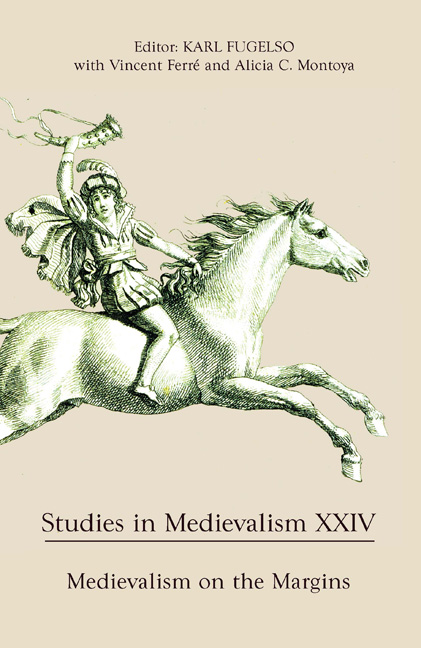Book contents
- Frontmatter
- Acknowledgments
- Contents
- List of Illustrations
- Volume XXIV 2015
- Editorial Note
- I Medievalism on the Margins: Some Perspective(s)
- 1 Medievalism in the Margins: Paratexts and the Packaging of Medieval French Literature
- 2 Medievalism Studies and the Subject of Religion
- 3 Pop Medievalism
- 4 Ecomedievalism: Applying Ecotheory to Medievalism and Neomedievalism
- 5 Whiteness and Time: The Once, Present, and Future Race
- 6 A Desire for Origins: The Marginal Robin Hood of the Later Ballads
- 7 Women, Queerness, and Massive Chalice: Medievalism in Participatory Culture
- 8 “Constant inward looking,” Medieval Devotional Literature, and the Concordium-Fruitlands Library
- II Trans-Atlantic Medievalism(s)
- III Other Interpretations
- Contributors
4 - Ecomedievalism: Applying Ecotheory to Medievalism and Neomedievalism
from I - Medievalism on the Margins: Some Perspective(s)
Published online by Cambridge University Press: 05 December 2015
- Frontmatter
- Acknowledgments
- Contents
- List of Illustrations
- Volume XXIV 2015
- Editorial Note
- I Medievalism on the Margins: Some Perspective(s)
- 1 Medievalism in the Margins: Paratexts and the Packaging of Medieval French Literature
- 2 Medievalism Studies and the Subject of Religion
- 3 Pop Medievalism
- 4 Ecomedievalism: Applying Ecotheory to Medievalism and Neomedievalism
- 5 Whiteness and Time: The Once, Present, and Future Race
- 6 A Desire for Origins: The Marginal Robin Hood of the Later Ballads
- 7 Women, Queerness, and Massive Chalice: Medievalism in Participatory Culture
- 8 “Constant inward looking,” Medieval Devotional Literature, and the Concordium-Fruitlands Library
- II Trans-Atlantic Medievalism(s)
- III Other Interpretations
- Contributors
Summary
This essay applies ecocriticism to the study of neomedieval texts, an approach that I term “ecomedievalism.” Ecomedievalism interlaces study of neomedievalisms through the bifurcated lens of ecocriticism and ecomaterialism. Neomedieval texts continually deploy environmental descriptions and language to develop a sense of an authentic medieval setting, part of the worldbuilding process, yet little critical attention is devoted to analyzing these methods from an ecological perspective. Ecocriticism's rapid theorization has allowed the field to move beyond the political activism that characterized its origins, and now offers an opportunity to begin academic study of the fictional environments in neomedievalisms. Consequently, this essay seeks to demonstrate how neomedievalism can benefit from the ecocritical readings that traditional medieval studies are embracing. Eco-readings recognize and distinguish the role of the human in monolithic, romanticized visions of “nature” that otherwise lead to fantasies of a recoverable Edenic condition. These fantasies are dangerous because they produce a false nostalgia to legitimize modern oppressions rooted, and thus passively justified, in history or tradition. A retroactive myth of imperialism, for example, holds that prior to conquest and colonization native peoples did not exert (proper) agency upon their natural environments. By this logic, invasion civilizes land through cultivation but also gives the invaders more rights to environmental control than the original inhabitants.
Ecomedievalism encourages interdisciplinary research to reveal and consequently problematize the constructed fantasies of nature that fill neomedieval stories. The root of ecomedievalism challenges the Anglo-American conviction that a pure “wilderness,” a primeval landscape completely (or largely) untouched by human hands, can exist. Ecomedievalism allows, through interdisciplinary methods, consideration of how the presentation of medieval landscapes in neomedieval texts constitutes a socially constructed ecology, one that has the potential to bridge the producer–consumer divide, skew critical reception of texts, and passively support existing cultural biases with real-world consequences.
A definitive theorization of ecomedievalism is not the goal of this essay. Instead, my discussion will focus on a single ecological element, the forest, to trace the possibilities offered by a reading characterized by ecomedievalism.
- Type
- Chapter
- Information
- Studies in Medievalism XXIVMedievalism on the Margins, pp. 31 - 38Publisher: Boydell & BrewerPrint publication year: 2015



